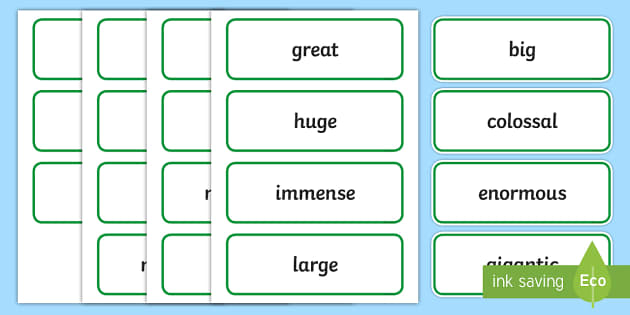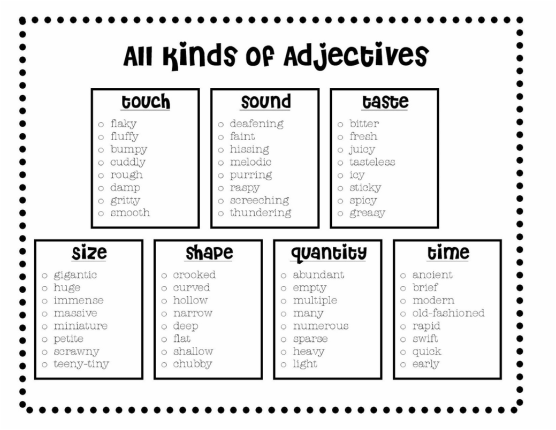
What Is Adjective Size?
Introduction
Adjectives are words that describe or modify nouns or pronouns. Adjectives of size describe the physical dimensions of something, such as its height, width, length, or depth. Some examples of adjectives of size include:
- big
- small
- tall
- short
- wide
- narrow
- deep
- shallow
- large
- tiny
- huge
- mammoth
- microscopic
Adjectives of size can be used to compare things, such as in the sentences "The elephant is bigger than the dog" and "The mountain is taller than the hill." They can also be used to describe the relative size of something, such as in the sentences "This room is large" and "This car is small."
Types of adjectives of size
There are two main types of adjectives of size:
- Qualitative adjectives describe the subjective quality of something, such as its beauty, goodness, or badness. Qualitative adjectives of size can be used to express personal opinions or preferences. For example, you might say that a particular house is "huge" or "tiny," depending on your own personal preferences.
- Quantitative adjectives describe the objective quantity of something, such as its number, amount, or size. Quantitative adjectives of size are more precise and less subjective than qualitative adjectives. For example, you might say that a particular house is "2,000 square feet" or "4 bedrooms and 3 bathrooms."
Using adjectives of size in sentences
Adjectives of size can be used in a variety of ways in sentences. They can be placed before or after the noun they describe, and they can be used to compare or contrast things.
For example, here are some sentences that use adjectives of size:
- The big dog chased the small cat.
- The tall tree is taller than the short tree.
- The wide river is wider than the narrow river.
- The deep pool is deeper than the shallow pool.
- The large city is larger than the small town.
- The tiny ant is smaller than the huge elephant.
- The mammoth mountain is bigger than the microscopic cell.
Adjectives of size can also be used to create vivid images in the reader’s mind. For example, here are some sentences that use adjectives of size to create imagery:
- The towering redwood trees reached up to the sky.
- The vast desert stretched out as far as the eye could see.
- The tiny hummingbird flitted from flower to flower.
- The mighty ocean waves crashed against the shore.
Conclusion
Adjectives of size are a versatile and important part of the English language. They can be used to describe the physical dimensions of something, compare and contrast things, and create vivid images in the reader’s mind.
HTML format
<section> <h2>What Is Adjective Size?</h2> <p>Adjectives are words that describe or modify nouns or pronouns. Adjectives of size describe the physical dimensions of something, such as its height, width, length, or depth.</p> </section> <section> <h2>Types of adjectives of size</h2> <p>There are two main types of adjectives of size:</p> <ul> <li>Qualitative adjectives describe the subjective quality of something, such as its beauty, goodness, or badness.</li> <li>Quantitative adjectives describe the objective quantity of something, such as its number, amount, or size.</li> </ul> </section> <section> <h2>Using adjectives of size in sentences</h2> <p>Adjectives of size can be used in a variety of ways in sentences. They can be placed before or after the noun they describe, and they can be used to compare or contrast things.</p> <ul> <li>The big dog chased the small cat.</li> <li>The tall tree is taller than the short tree.</li> <li>The wide river is wider than the narrow river.</li> <li>The deep pool is deeper than the shallow pool.</li> <li>The large city is larger than the small town.</li> <li>The tiny ant is smaller than the huge elephant.</li> <li>The mammoth mountain is bigger than the microscopic cell.</li> </ul> </section> <section> <h2>Conclusion</h2> <p>Adjectives of size are a versatile and important part of the English language. Weba soft greasy substance occurring in organic tissue. gigantic. exceedingly large or extensive. colossal. so great in size or force or extent as to elicit awe. short.. Web1 size / ˈ saɪz/ noun. plural sizes. Britannica Dictionary definition of SIZE. 1. a : the total amount of physical space that a person or thing occupies : how large or small someone. Websize meaning: 1. how large or small something or someone is: 2. one of the standard measures according to which…. Learn more. WebHere's the word you're looking for. Included below are past participle and present participle forms for the verb size which may be used as adjectives within certain contexts. sized.. WebOrder of adjectives. When more than one adjective comes before a noun, the adjectives are normally in a particular order. Adjectives which describe opinions or attitudes (e.g..

Size Adjectives Word Cards (teacher made) – Twinkl – Source: twinkl.co.uk

Size Adjectives in English – English Study Here | English adjectives, English study, Adjectives – Source: pinterest.es

Adjectives – Source: eselder.weebly.com
What Is Adjective Size, ADJECTIVE || Colour_Shape_Size || How to use adjectives in a sentence || Liy Learns Tutorial, 7.44 MB, 05:25, 9,859, Liy Learns Tutorial, 2022-10-24T20:00:02.000000Z, 2, Size Adjectives Word Cards (teacher made) – Twinkl, 315 x 630, jpg, , 3, what-is-adjective-size
What Is Adjective Size. WebSize: Age: Shape: Color: Proper adjective: Purpose or qualifier: Noun: A: beautiful: old: Italian: sports: car: The: three: beautiful: little: gold: plates: An: amazing: heart-shaped:.
What is the use of an adjective in a sentence? Come and let’s explore more about adjectives in this video.
#adjectives #adjective #shape #colour #size
Size Adjectives Word Cards (teacher made) – Twinkl
What Is Adjective Size, Websize meaning: 1. how large or small something or someone is: 2. one of the standard measures according to which…. Learn more. WebHere's the word you're looking for. Included below are past participle and present participle forms for the verb size which may be used as adjectives within certain contexts. sized.. WebOrder of adjectives. When more than one adjective comes before a noun, the adjectives are normally in a particular order. Adjectives which describe opinions or attitudes (e.g..
ADJECTIVE || Colour_Shape_Size || How to use adjectives in a sentence || Liy Learns Tutorial

Source: Youtube.com
Type of Adjectives | Adjectives Color, Size, Texture, Shape, Quality | How to use the adjectives.

Source: Youtube.com
.
Is small an adjectives.
Is small an adjectives
Is small an adjectives What is the adjective form of size.
.
What is the adjective form of size
What is the adjective form of size What is size adjective.
.
What is size adjective
What is size adjective What is the adjective form of size.
www.learngrammar.net › english-grammar › adjectiveWhat is Adjective? Types of Adjectives with Definitions and …
It normally indicates quality, size, shape, duration, feelings, contents, and more about a noun or pronoun. Adjectives usually provide relevant information about the nouns/pronouns they modify/describe by answering the questions: What kind? How many? Which one? How much? Adjectives enrich your writing by adding precision and originality to it. .
www.scribbr.com › parts-of-speech › adjectivesWhat Is an Adjective? | Definition, Types & Examples – Scribbr
Parts of speech. What Is an Adjective? | Definition, Types & Examples. Published on August 21, 2022 by Eoghan Ryan . Revised on October 3, 2023. An adjective is a word that modifies or describes a noun or pronoun. Adjectives can be used to describe the qualities of someone or something independently or in comparison to something else. .
.
www.merriam-webster.com › grammar › what-is-an-adjectiveWhat is an Adjective? | Merriam-Webster
Popular. What is an Adjective? The Basics. Adjectives are words that describe something or someone. Scruffy, purple, concerned, and special are all adjectives. They usually (but not always) come right before what they are describing. Here are some examples: “A scruffy dog sat in the window.” .
.
dictionary.cambridge.org › adjectives-orderAdjectives: order – Grammar – Cambridge Dictionary
from English Grammar Today. Order of adjectives. When more than one adjective comes before a noun, the adjectives are normally in a particular order. Adjectives which describe opinions or attitudes (e.g. amazing) usually come first, before more neutral, factual ones (e.g. red): She was wearing an amazing red coat. Not: … red amazing coat. .
.
.
.
www.woodwardenglish.com › lesson › adjectives-word-orderAdjectives – Word Order | Woodward English
An adjective is a word that describes something (a noun). An adjective gives us more information about a person or thing. Correct order of adjectives. Adjectives sometimes appear after the verb To Be (CARD – LINK TO VIDEO) The order is To Be + Adjective. He is tall. She is happy. Adjectives sometimes appear before a noun. .
www.grammar-monster.com › order_of_adjectivesOrder of Adjectives – Grammar Monster
The order of adjectives in English is determiner, quantity, opinion, size, physical quality, shape, age, color/colour, origin, material, type, and purpose. There is a table below with lots of examples. .
www.grammarly.com › blog › adjectiveWhat Is an Adjective? Usage and Examples | Grammarly
Updated on April 6, 2023 Grammar. Adjectives are words that describe the qualities or states of being of nouns: enormous, doglike, silly, yellow, fun, fast. They can also describe the quantity of nouns: many, few, millions, eleven. .